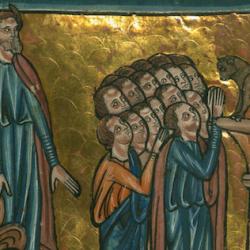In his Not Bread Alone, Nathan MacDonald cites the letter to Aristeas, which includes an early Christian attempt to explain the food laws of Leviticus and Deuteronomy. For Aristeas, the food laws were instructive to human beings. Clean animals ruminate; they encourage us to keep things in memory.
Ariesteas write: “all cloven-footed creatures and ruminants quite clearly express, to those who perceive it, the phenomenon of memory. Rumination is nothing but the recalling of (the creature’s) life and constitution, life being usually constituted by nourishment.” And again: God “has ordained every time and place for a continual reminder of the supreme God and upholder (of all). Accordingly in the matter of meats and drinks he commands men to offer first fruits and to consume them there and then straightaway. Furthermore in our clothes he has given us a distinguishing mark as a reminder, and similarly on our gates and doors he has commanded us to set up the ‘Words’, so as to be a reminder of God’” (quoted p. 70).
MacDonald thinks the connection of food and memory is both anthropologically sound and biblically rooted. Food “reveals significant and changing attitudes about social structure, national identities, gender roles and religious beliefs. Consequently food is an important source of historical knowledge. Yet food is not merely a part of the past; it is also a means of remembering the past. As David Sutton puts it, ‘if we are what we eat, then we are what we ate as well.’ Memories are formed within communities, and food is one of the ways in which communities structure the past” (71). He quotes Sutton again a few pages later: “Food is equally important in the creation of prospective memories, that is, in orientating people toward future memories that will be created in the consumption of food” (73).
Deuteronomy is the biblical book that develops this connection most explicitly. MacDonald points to the “historical credo” of Deuteronomy 26, the recital of Israel’s history that worshipers recited as they offered firstfruits: “The memorialized history itself reflects this with the contrast between Israel’s earlier landless existence and the situation of the offerer. Whether as wandering Aramean or as landless alien in Egypt, Israel’s national life prior to the conquest lacked possession of land. Lack of land means neither more nor less than a precipitous existence without a secure source of food. What is offered to YHWH, the giver of the land, is food, the produce of the land” (77-8).
The festival calendar of Deuteronomy reinforces this linkage: “The Deuteronomic cult is centred around communal acts of eating which connect the memory of the past actions of YHWH with the present experience of divine generosity in the Promised Land. The memory of the past and the experience of the present are united in acts of joyful celebration, which are central to the Deuteronomic concept of worship” (79).
At the same time, food can be a cause of forgetfulness. Sated, Israel forgets the Giver of the land and begins to think that it acquired the land by its own power. Especially in Deuteronomy 8 “the theme of memory and forgetting receives extended exposition: Israel is to remember the wilderness (8.2–4); she is not to forgetYHWH (8.11, 14), but to remember him (8.18); following other gods is to forget YHWH (8.19). Deuteronomy 8 utilizes the liminal setting of the book of Deuteronomy to view the past experience of the wilderness and the future experience of the Promised Land. The Promised Land is described in an exuberant, almost poetic, manner that draws attention to the land’s abundant supply of food. . . . The danger is that the abundance of the land will result in forgetfulness where the people attribute the possession of the land to their own strength and not to the actions of YHWH” (84).
According to Moses in Deuteronomy, Israel staves off this danger by another act of rumination, by remembering the wilderness years, when they were utterly dependent on the bread from heaven, when the Lord made them fast to teach them that they do not live by bread alone and that the bread they eat comes from Him.















